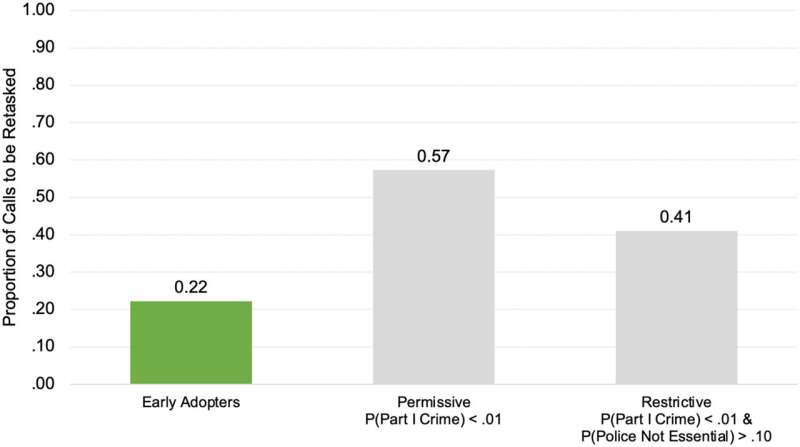This article has been reviewed according to Science X's editorial process and policies. Editors have highlighted the following attributes while ensuring the content's credibility:
fact-checked
trusted source
proofread
Civilian 911 responders can enhance public safety, study finds

Deploying paramedics, social workers, and others to non-criminal emergency calls could significantly boost a police department's ability to respond to criminal emergencies while reducing negative interactions with the community, according to new University of Maryland research.
A study based on Baltimore Police Department data published in Justice Quarterly showed that up to 57% of 911 calls could be assigned to non-police responders, which would free up at least 59 full-time officers, or about 9% of the department's patrol personnel.
The study, led by Luke Spreen, an assistant professor at the School of Public Policy, and Greg Midgette, an assistant professor in the Department of Criminology and Criminal Justice (CCJS), introduces a model to assess the impacts of call diversion programs, offering policymakers a tool for evidence-based decision-making.
"Public safety is one of the most significant categories of municipal spending," Spreen said. "Focusing exclusively on the costs of operating a civilian responder program ignores positive downstream benefits it is likely to generate, such as reductions in arrests." The study was supported by Arnold Ventures and Abell Foundation grants.
Co-authors also include Distinguished University Professor Peter Reuter in public policy and CCJS and Associate Professor Lauren C. Porter and Assistant Professor Brooklynn K. Hitchens, both of CCJS.
Their pathway of sending civilian first responders to calls that don't require armed officers can help address questions of how police departments deploy their personnel following a high-profile series of officer-involved killings of Black people, including Breonna Taylor and George Floyd. Recent studies have shown that police are more likely to use force when interacting with Black people and that Black people are more likely to believe that police act unjustly.
Spreen acknowledged that shifting resources has a political dimension but said the landscape has shifted in the wake of incidents of police misconduct, along with growing evidence that diversion programs work.
Successful programs to divert low-risk 911 calls from police officers to civilian responders often start small, gradually scaling up to demonstrate effectiveness and build community trust. "We believe this is the correct approach," said Spreen, "though our analysis suggests that most existing diversion programs may still be too small."
Case studies of call diversion programs in cities like Albuquerque, Atlanta, Denver, and Houston help underscore the importance of investing in training for emergency call takers and dispatchers to identify suitable calls for civilian response.
"It is very challenging to parse exactly what event is unfolding from a 911 call or how much danger it poses to the first responder," Spreen said.
The researchers also called for the use of performance metrics to evaluate program effectiveness and guide future development.
More information: Greg Midgette et al, A Model to Assess the Feasibility of 911 Call Diversion Programs, Justice Quarterly (2024). DOI: 10.1080/07418825.2023.2300444
Provided by University of Maryland





















